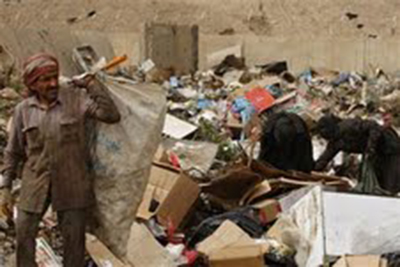When the administration of President George W. Bush planned the invasion of Iraq, hopes ran high that the massive deployment of troops and money wouldn’t just result in the toppling of Saddam Hussein: The United States would help create a country that stood as an example to others.
Ten years ago Tuesday, Bush announced military operations “to disarm Iraq, to free its people and to defend the world from grave danger.” He warned that the coalition campaign “could be longer and more difficult than some predict,” but vowed to give the Iraqis a “united, stable and free country.”
In a speech only weeks earlier, the president had stressed that “a liberated Iraq can show the power of freedom to transform that vital region, by bringing hope and progress into the lives of millions.” When the administration of President George W. Bush planned the invasion of Iraq, hopes ran high that the massive deployment of troops and money wouldn’t just result in the toppling of Saddam Hussein: The United States would help create a country that stood as an example to others.
Ten years ago Tuesday, Bush announced military operations “to disarm Iraq, to free its people and to defend the world from grave danger.” He warned that the coalition campaign “could be longer and more difficult than some predict,” but vowed to give the Iraqis a “united, stable and free country.”
In a speech only weeks earlier, the president had stressed that “a liberated Iraq can show the power of freedom to transform that vital region, by bringing hope and progress into the lives of millions.” An estimated $61 billion in U.S. reconstruction funds later, reality has fallen short of these expectations
An estimated 189,000 people — including Iraqi civilians, U.S. troops and journalists — were killed in the war in Iraq since 2003.
And yet Iraq is now OPEC’s second-largest oil producer after Saudi Arabia. It is headed toward becoming the world’s second-largest oil exporter after Russia in 20 years. The civil war that raged after the invasion is over, and elections have been held in which Iraqis vote at relatively high rates.
On the 10th anniversary of the invasion of Iraq, NBC News asked Iraqis and experts to assess how life had changed.
Utilities and services
Omar Qais, 34, a private security worker from Baghdad:
“The infrastructure, and the services … were bad, but now it is even worse.”
Mohammad Jabir, 33, unemployed with two children:
“There isn’t … one good service. It has gone from bad to worse.”
Iraq is a rich country when it comes to natural resources.
“Iraq stands to gain almost $5 trillion in revenues from oil exports over the period to 2035, an annual average of $200 billion and an opportunity to transform the country’s future prospects,” according to the International Energy Agency.
But much of that wealth has yet to trickle down to the population in the form of jobs and services.
Unemployment stands at 15 percent and youth unemployment at 30 percent, according to the United Nations Development Program (UNDP). Twenty-three percent of the population lives in extreme hunger, it adds.
“Iraq faces considerable challenges in sanitation,” according to a 2010 U.N. report. Only 26 percent of household are covered by the public sewage network, it added.
About two-thirds of homes depend on the public water supply as their primary source for drinking water, but a quarter of these reported that they got potable water for under two hours per day, according to the Special Inspector General for Iraq Reconstruction’s January 2012 report.
Electricity is the worst-rated service in Iraq, according to the Iraq Knowledge Network, a monitoring system set up by the country’s planning ministry. Households get on average 7.6 hours of electricity from the national grid per day, it said. Medical services leave much to be desired. In the region, only Yemen has a higher infant mortality rate, for example. Malaria, however, has been almost eliminated, according to the U.N.
Source : NBC News
H.SH

